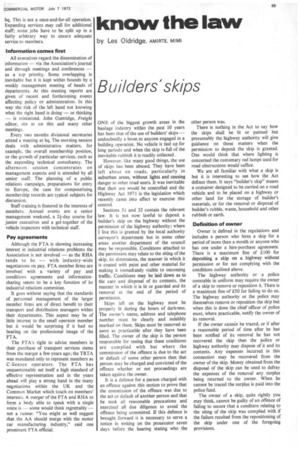Know the aw
Page 91

If you've noticed an error in this article please click here to report it so we can fix it.
by Les Oldridge, AMIRTE, MIMI
Builders'skips
ONE of the biggest growth areas in the haulage industry, within the past 10 years has been that of the use of builders' skips — undoubtedly a boon to anyone engaged in a building operation. No vehicle is tied up for long periods and when the skip is full of the inevitable rubbish it is readily collected .
However, like many good things, the use of skips has been abused. They have been left about on roads, particularly in suburban areas, without lights and causing danger to other road users. It was inevitable that their use would be controlled and the Highway Act 1971 is the legislation which recently came into effect to exercise this control.
Sections 31 and 32 contain the relevant law. It is not now lawful to deposit a builder's skip on the highway without the permission of the highway authority; where I live this is granted by the local authority surveyor's department but in some other areas another department of the council may be responsible. Conditions attached to the permission may relate to the siting of the skip, its dimensions, the manner in which it is coated with paint and other material for making it immediately visible to oncoming traffic. Conditions may he laid down as to the care and disposal of its contents, the manner in which it is lit or guarded and its removal at the end of the period of permission.
Skips left on the highway must be properly lit during the hours of darkness. The owner's name, address and telephone number must be clearly . and indelibly marked on them. Skips must be removed as soon as practicable after they have been filled. The owner of the skip is the person responsible for seeing that these conditions are complied with but where the commission of the offence is due to the act or default of some other person then that person may be charged and convicted of the offence whether or not proceedings are taken against the owner.
It is a defence for a person charged with an offence against this section to prove that the commission of the offence was due to the act or default of another person and that he took all reasonable precautions and exercised all due diligence to avoid the offence being committed. If this defence is brought forward it is necessary to serve a notice in writing on the prosecutor seven days before the hearing stating who the other person was.
There is nothing in the Act to say how the skips shall be lit or painted but presumably the highway authority will give guidance on these matters when the permission to deposit the skip is granted. One would think that where lighting is concerned the customary red lamps used for road obstructions would suffice.
We are all familiar with what a skip is but it is interesting to see how the Act defines them. It says "builder's skip" means a container designed to be carried on a road vehicle and to be placed on a highway or other land for the storage of builder's materials, or for the removal or disposal of builder's rubble, waste, household and other rubbish or earth.
Definition of owner Owner is defined in the regulations and includes a person who hires a skip for a period of more than a month or anyone who has one under a hire-purchase agreement. There is a maximum fine of £100 for depositing a skip on a highway without permission or for not complying with the conditions outlined above.
The .highway authority or a police constable in uniform may require the owner of a skip to remove or reposition it. There is a maximum fine of £50 for failing to do so. The highway authority or the police may themselves remove or reposition the skip but when this is done the chief officer of police must, where practicable, notify the owner of its removal.
If the owner cannOt be traced, or if after a reasonable period of time after he has been notified of its removal he has not recovered the skip then the police or highway authority may dispose of it and its contents. Any expenses incurred in this connection may be recovered from the owner of the skip. Money obtained from the disposal of the skip can be used to defray the expenses of the removal any surplus being returned to the owner. When he cannot be traced the surplus is paid into the police fund.
The owner of a skip, quite rightly you may think, cannot be guilty of an offence of failing to secure that a condition relating to the siting of the skip was complied with if the failure resulted from the repositioning of the skip under one of the foregoing provisions.
















































































































































